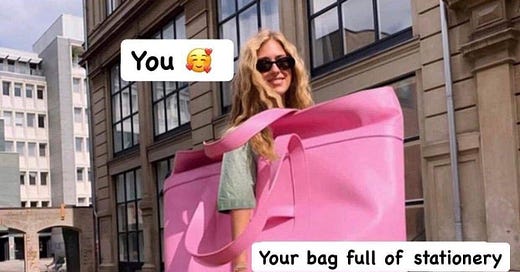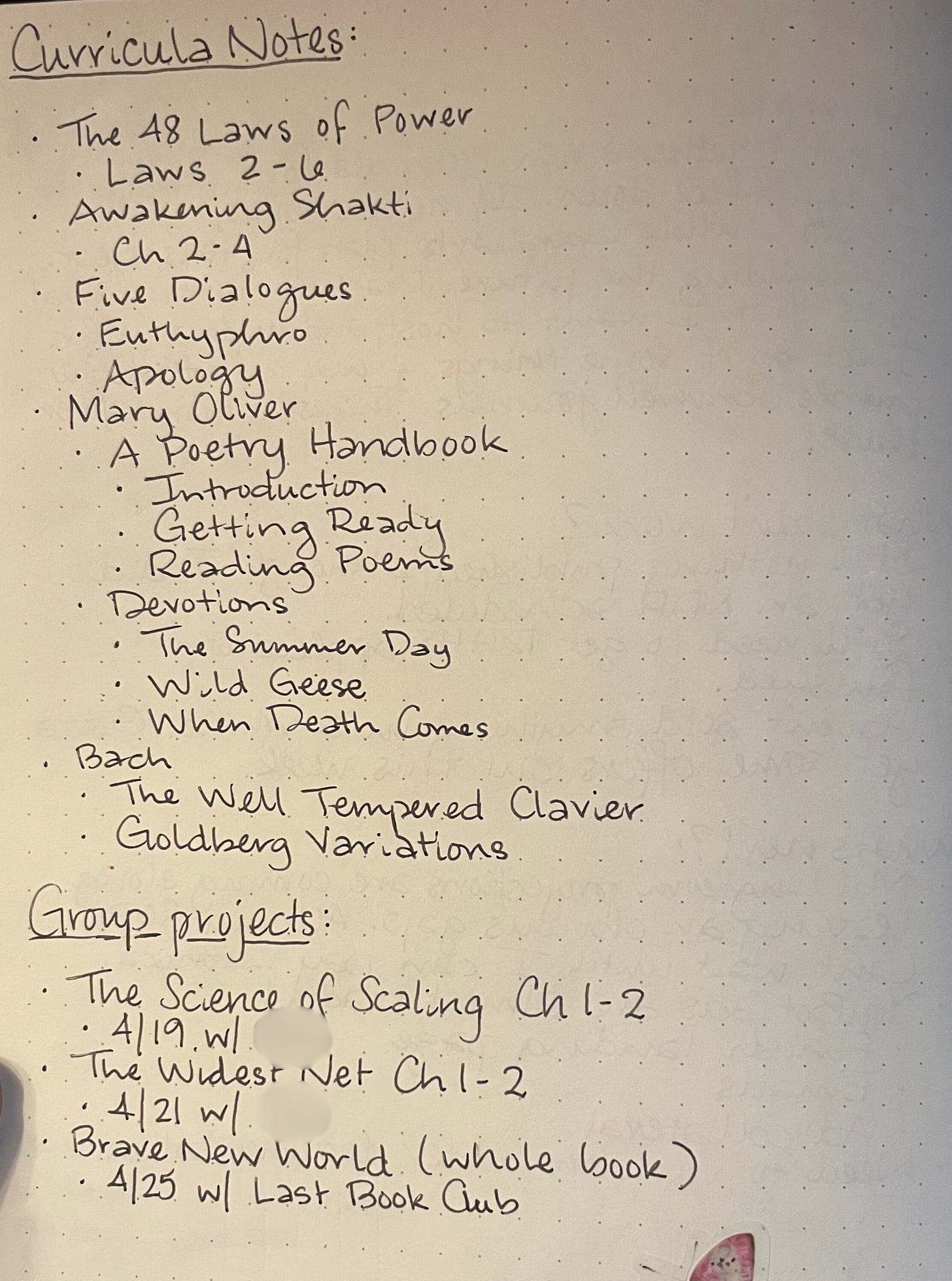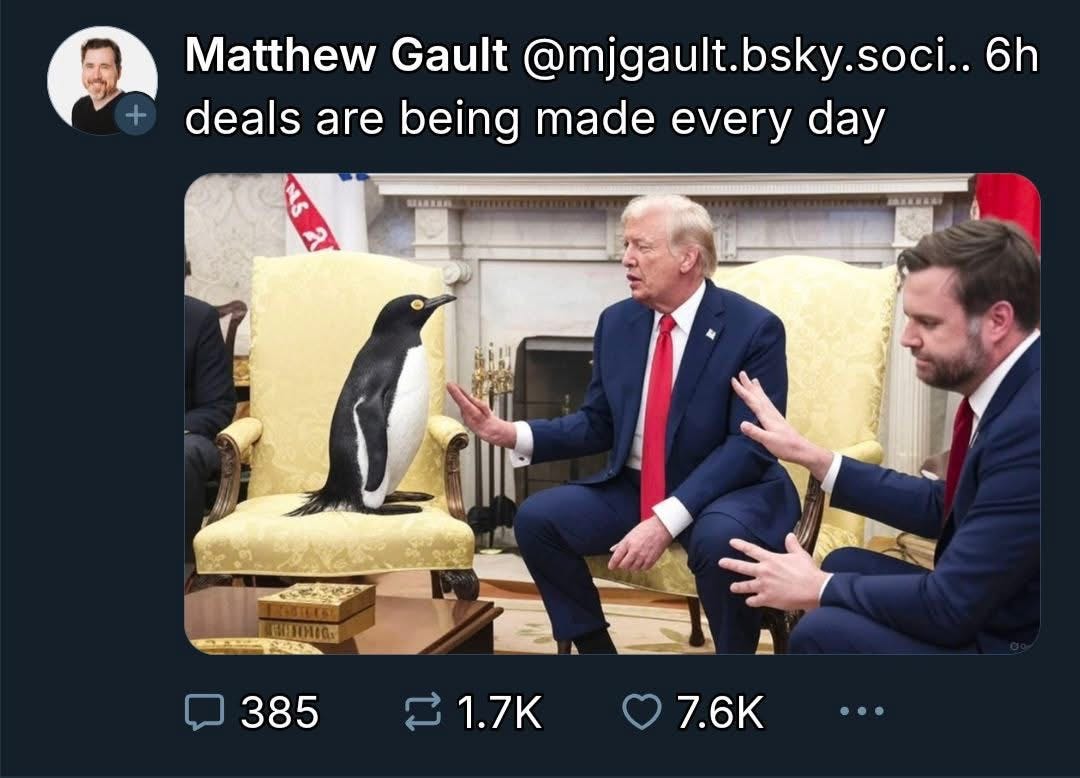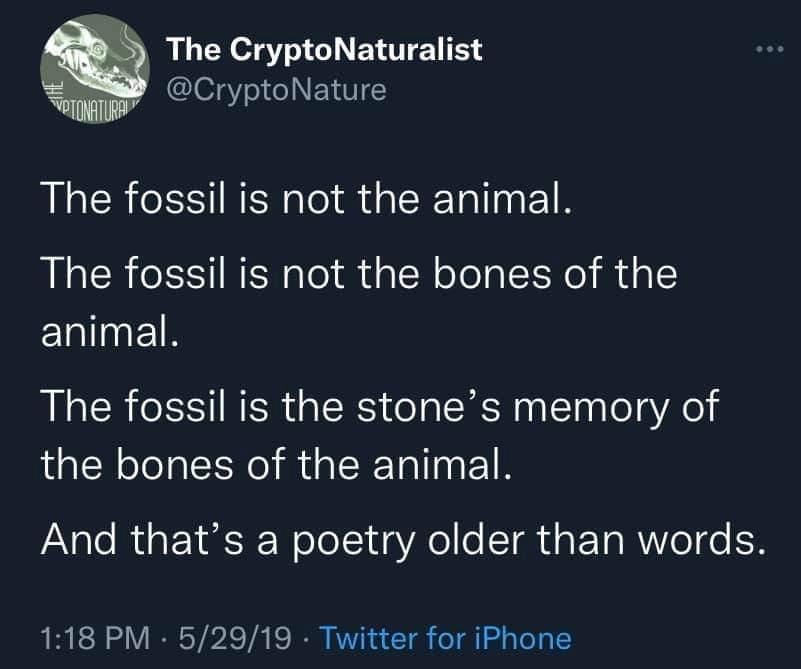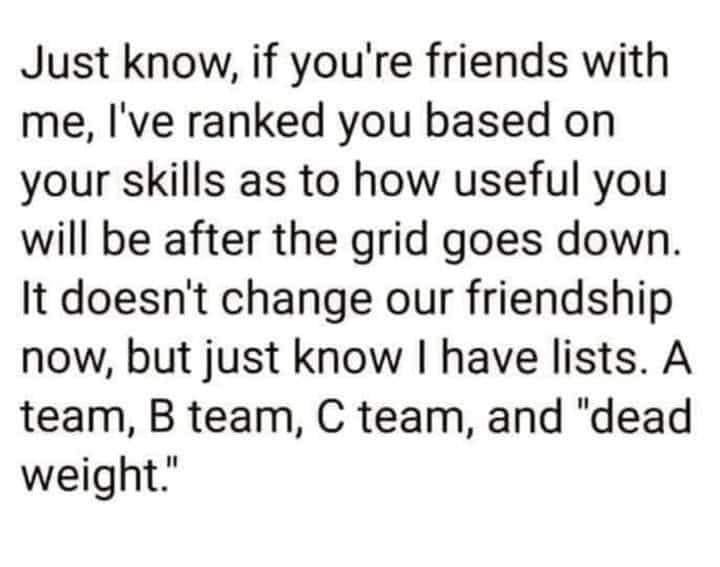One of the things I’ve been doing lately is building my capacity.
There’s a thing that is happening to me that I still can’t quite tell y’all about, and it requires a lot of it. And even though it’s a good thing, it’s a lot to hold. Plus, you know, societal collapse.
So I’ve been doubling down on taking care of the meatsack.
Quality sleep, fabulous meals, more exercise, better skincare, sacred rest. And a new, rigorous, self study curricula that I’ve designed for myself.
It’s that last one that I want to talk about today.
See, it might seem strange to be focusing on such intellectual pursuits at a time like this.
My argument is, there couldn’t BE a better time. (Say that with as much Chandler Bing as you can muster.) First, let’s talk about why that is.
One of my favorite writers, Meg Conley, writes about information preservation over at The Pocket Observatory. In her most recent Observation, she talks about how authoritarianism relies on information loss to control communities. They’re free to read and download, and I promise, everything Meg writes is worth your time.
I’m building a media network on the edge of the next revolution, so I can tell you that not only is that loss happening, but HOW it’s happening.
The first, and most egregious problem, is the consolidation of local news. In the last twenty years, more than 2000 local independent news outlets have been bought out or shuttered entirely—and that’s just television and newspapers. Those numbers don’t count local radio stations or independent zines. Today, more than 93% of all media coverage is owned by just SIX consolidated publishers.
This also doesn’t account for indie publishing either, of which a shocking 82% is largely conservative. That makes the young male radicalization pipeline easier to understand, though, especially if that’s his only perceived option.
Information loss is also occurring right in front of your face, and chances are good, you don’t even know about it. It’s not just AI either, although trust me, we will get to that in a second.
I first heard about the dead internet theory on Reddit, and while it’s not true, it’s also not…not true? A great deal of what we think of as the internet is increasingly filled with dead links and deleted or unarchived websites or information. Meta’s announced that it’s deleting old lives, but I think they’ve been quietly deleting old posts for years, and just hoping people won’t notice.
I know, because a lot of my old post links don’t work. But who among us has documentation of posts that are more than a few years old? Besides freaks like me, obviously.
However, there’s an even more important question to ask here, which is, why it even matters in the first place?
My answer is, because that’s our history being erased.
And that history is what has been used to train the AI. Big tech freely admits it these days, and perhaps even more irritatingly, are asking you to just get over it.
I’ve written before about why we have to overlook the moral questions when it comes to our own use of AI, but that doesn’t mean there aren’t pressing moral questions here. And frankly, I’m just a little concerned that the AI has access to all of humanity’s innermost thoughts circa 2006, and we don’t.
Especially if 80% of that material has conservative bias.
This is the shit that keeps me awake at night, tbh.
Which brings us back to Mary Oliver.
I know what I’m doing with my one wild and precious life, and it includes reading and repeating those words as often as possible. If we’re losing information, then it becomes all of our responsibilities to personally archive as much information as we can. Not just physically, although that too matters, but…mentally, emotionally, spiritually.
Information is resistance.
And what you archive will depend a great deal on who you are as a person, what you value, and what you build time and capacity for.
For me, that will always be philosophy, psychology, poetry, magic, faith. With a little bit of business thrown in.
These books were chosen with care. I’ve read many of them before. Now, I’m reading for retention, with the intention of documentation, and awareness of its purpose.
This isn’t lazy afternoon fiction. (I’m still making my way through The Expanse for that.) This is reading as if my life depends on it. Because someday it might.
So, because I know you’re curious, here’s how I’m doing this.
About a third of my current program comes from
’s Humanities Curriculum, which you can find here (paywalled). It’s been well worth the $6 a month.Next, I designed a poetry self-study, using a framework adapted from Sean and
. That framework is here, and if self study matters to you, you should adopt it immediately.Then, there’s the group and buddy reads. For these, I picked books from my list that I want to read, but probably won’t without a deadline. (Often these are the business books.) Found someone to read them with me, and presto. I also joined a few book clubs, but that usually delights me.
Finally, there’s the books I’m reading with intent to archive.
Last year, I started a zettlekasten. If you’re not steeped in productivity culture, this is a physical notecard system. There’s people who do it digitally, but tbh, that mostly defeats the purpose of a zettlekasten. A personal archive that you can touch is the whole point.
I’ll write down meaningful ideas, concepts that I want to remember, and direct quotes—I’ve copied whole poems onto these cards.
They can’t burn everything, you see.
And they especially can’t take it from you if it’s memorized.
It’s important that you understand that this isn’t yet another thing that I added to my to-do list to feel guilty about if I didn’t get to it. There’s enough of that shit already.
Before I designed my personal self-study program, I thoughtfully considered my time and availability to add it into my schedule.
I blocked out all of Friday for education (including events in Solo School, the Network, and in person). Several hours on Tuesdays and Thursdays, my client free flow days. And some time on the weekend.
I deliberately made time.
Then, I picked stuff that I knew I would enjoy to start rebuilding the study muscle. It’s been a long time since I studied deliberately, and I want this first push to be mostly fun for me.
Next, I built a StudyBot, because I mean, obviously. (Want to know more about it? It’s part of my Board of Directors.)
There’s a lot of worry in academia about how generative AI will shape education in the future. And when your program of study is built on the memorization of facts, with testing that judges fact regurgitation and not comprehension, frankly, I think they get what they deserve.
Outsourcing our critical thinking to AI is indeed problematic. But we can just as easily use it to build those skills. It’s all in our approach.
Because the StudyBot is trained on my personal curricula, it can tell me how what I’m learning is connected to other things. It can point out gaps in my reading. It can tell me if something I’ve added needs to be read completely, or just gutted (a term I’ve borrowed from
describing how to read nonfiction without reading it cover to cover).It also helps me make sense of what I’m reading, provides journal prompts, context outlines, all manner of useful things.
Finally, there’s the documentation. The curriculum itself lives in a Notion database, because of course it does. I started by adding the books I wanted to read, programs I wanted to use, resources, all that stuff. This is always a work in progress, because I don’t believe in forcing myself to read books I hate, and there’s always new shiny objects that I want to learn about to add.
Every week, I go through what’s in my current study dashboard, document what I did, and plan out the following week. These are push goals. I’m mostly not getting all of this reading done every week, but if I push, I’m much more likely to get a good amount done.
The cards themselves get dumped into a box. For now.
See, zettlekasten is a not just a collection system, it’s also a thinking system. And what I know about systems is that it’s much easier to figure out how to build a system when you know what’s in it. I figure I have to have at least 500 cards before I can start figuring out a methodology of categorization.
And because I’m this kind of crazy, the idea of creating 500 index cards full of stuff delights every part of me, especially my inner child huffing the smell of Office Max in August.
And that’s what I want you to take away from this.
Your archive, your self-study, should delight you.
My friend Joa calls these times we’re currently living in “blursed,” a portmanteau of blessed and cursed. "There are decades where nothing happens; and there are weeks where decades happen,” said Lenin, and I suppose he would know.
If we’re living through those weeks now, then it behooves us to act as if we had decades.
To stuff as much joy and delight as we possibly can around and in and through our activism.
Plus, and I can’t emphasize this enough—if I’m reading poetry, I’m not reading the news.


